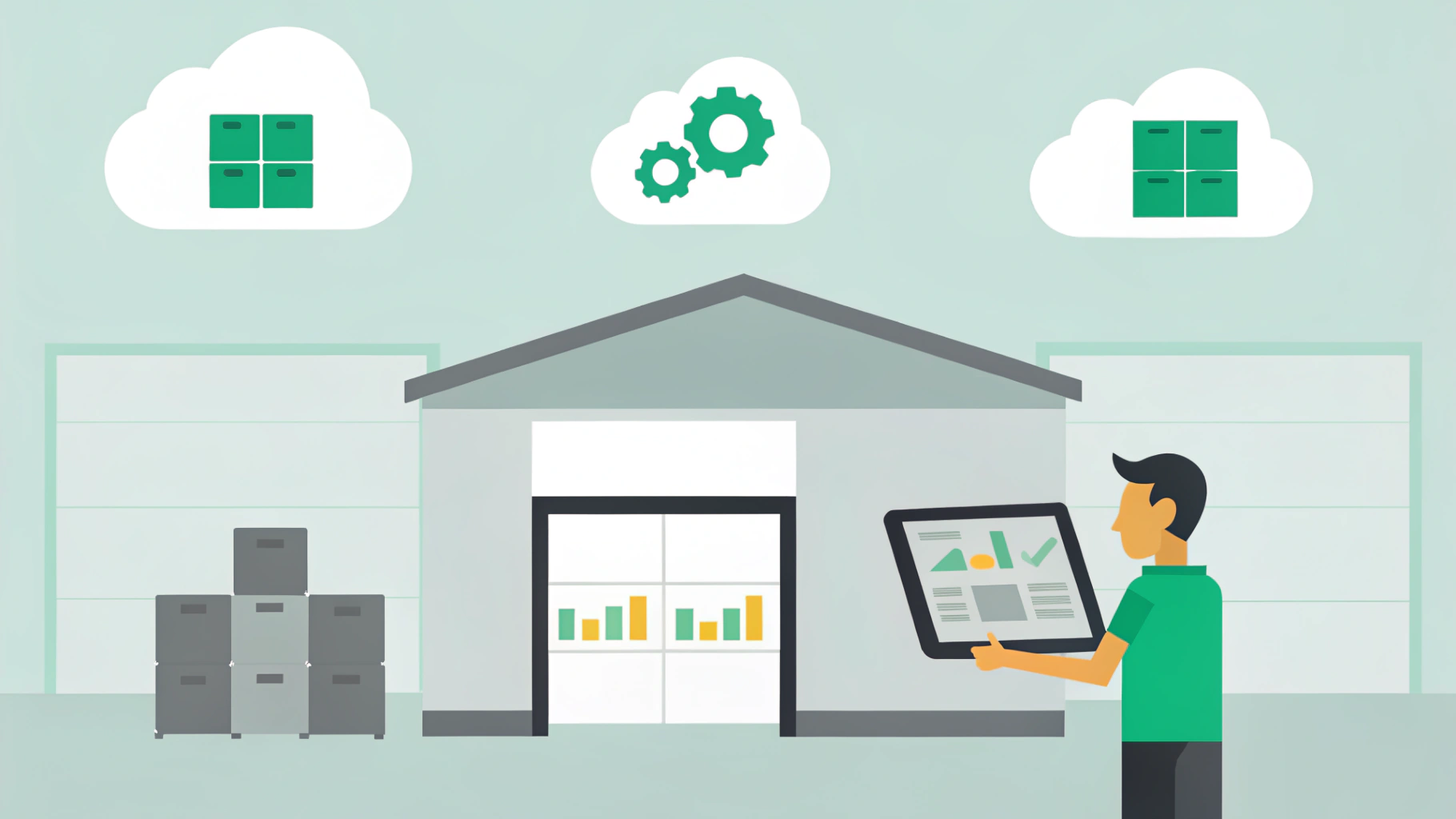Overview
This article presents ten compelling benefits of cloud-based Warehouse Management Systems (WMS) that significantly enhance the efficiency of distributors. Key advantages include:
- Real-time data processing
- Cost-effectiveness
- Scalability
- Improved inventory management
Each benefit is supported by robust evidence demonstrating how these systems streamline operations, reduce costs, and facilitate rapid adaptation to market demands. Ultimately, these factors drive profitability and provide a competitive edge in the distribution sector.
By implementing a cloud-based WMS, distributors can expect to see transformative changes in their operations. The integration of real-time data processing allows for timely decision-making, while cost-effective solutions lead to substantial savings. Scalability ensures that businesses can grow without the constraints of outdated systems. Improved inventory management not only minimizes waste but also enhances customer satisfaction through better service delivery.
The evidence is clear: adopting cloud-based WMS is not merely an operational upgrade; it is a strategic move that positions distributors for success in an ever-evolving market landscape. As distributors navigate the complexities of modern logistics, these systems empower them to meet challenges head-on, ensuring sustained profitability and a strong market presence.
Introduction
Cloud-based Warehouse Management Systems (WMS) are revolutionizing the distribution landscape, presenting a wealth of advantages that significantly enhance operational efficiency and profitability. By leveraging real-time data processing, these systems enable businesses to effectively monitor inventory, streamline order fulfillment, and foster collaboration among teams and partners. Yet, as the market continues to evolve at a rapid pace, one critical question arises: how can distributors fully harness the capabilities of cloud-based WMS not just to keep pace, but to excel in an increasingly competitive environment?
10X ERP: Real-Time Data Processing for Enhanced Operational Efficiency
10X ERP harnesses the power of cloud technology to deliver real-time information processing, enabling distributors to monitor inventory levels, track shipments, and manage orders with remarkable speed and precision. This capability not only minimizes delays but also enhances decision-making, allowing businesses to swiftly respond to market demands and operational challenges. For instance, real-time visibility into stock levels helps avert stockouts and overstock situations, thereby improving customer satisfaction and operational efficiency.
Industry leaders assert that effective real-time inventory tracking is essential for optimizing supply chain coordination. In fact, 70% of businesses report enhanced customer experiences following ERP integration. Moreover, the ability to access real-time information empowers distributors to make informed decisions, streamline operations, and ultimately drive profitability. By leveraging cloud technology, 10X ERP positions distributors to excel in a competitive landscape through a cloud based wms, ensuring they remain agile and responsive to the ever-changing market conditions.
Cost-Effectiveness: Reduce Operational Costs with Cloud-Based WMS
Cloud based WMS present significant financial advantages for distributors by drastically reducing operational costs. By removing the necessity for expensive on-premises hardware and maintenance, businesses can transition to a subscription-based model, such as the all-inclusive pricing offered by 10X ERP, which includes all functionalities, features, modules, tools, and dashboards. This model provides scalable services tailored to demand, thereby avoiding substantial upfront investments. Such flexibility is essential, particularly as the global WMS market, including cloud based WMS solutions, is projected to expand at a compound annual growth rate of 16.1% between 2022 and 2030, indicating a robust trend toward cloud solutions.
Furthermore, cloud based WMS solutions enhance operational efficiency by streamlining processes, which results in lower labor costs and fewer errors. For example, automated inventory tracking can significantly reduce the time dedicated to manual counts, allowing staff to focus on more strategic initiatives. Companies that have adopted cloud based WMS report an average reduction in operational costs by 20%, highlighting the tangible financial benefits of these systems, especially in the context of Warehouse Automation.
Financial analysts note that organizations utilizing centralized information systems experience a 25% improvement in decision-making speed, enabling them to respond more adeptly to market fluctuations. This capability is vital for distributors striving to remain competitive in a swiftly changing environment. Real-world examples further demonstrate these advantages; distributors employing cloud based WMS have achieved a 35% increase in order accuracy and a 20% decrease in operational costs, emphasizing the economic benefits of embracing cloud based WMS technologies. As Deloitte observes, “companies using Warehouse Automation saw an average 35% increase in order accuracy and reduced their operational costs by 20%.” Additionally, it is essential to consider implementation factors, such as the minimum user requirement of five users and the volume of information to transfer, which are crucial for a successful transition to cloud based WMS.

Scalability: Adapt to Business Growth with Cloud WMS Solutions
Cloud based WMS are distinguished by their exceptional scalability, which enables distributors to expand operations seamlessly. As businesses grow, they can easily add new warehouse locations, integrate additional inventory, and adapt to changing market demands without incurring substantial infrastructure costs. This flexibility is vital in today’s fast-paced environment, where responsiveness to customer needs is critical.
Consider the example of a distributor onboarding a new warehouse within weeks, integrating it into their existing system to ensure smooth operations across multiple sites. This rapid onboarding process not only boosts operational efficiency but also positions businesses to seize emerging opportunities. Furthermore, understanding user preferences regarding system functionalities, such as cookie management, can optimize the use of cloud based WMS, ensuring alignment with operational needs while enhancing user experience.
Logistics experts assert that leveraging cloud based WMS solutions is essential for adapting warehouse management to support sustained business growth. This strategic approach ultimately drives competitive advantage in the marketplace, making it imperative for Operations Managers to consider cloud based WMS for future success.
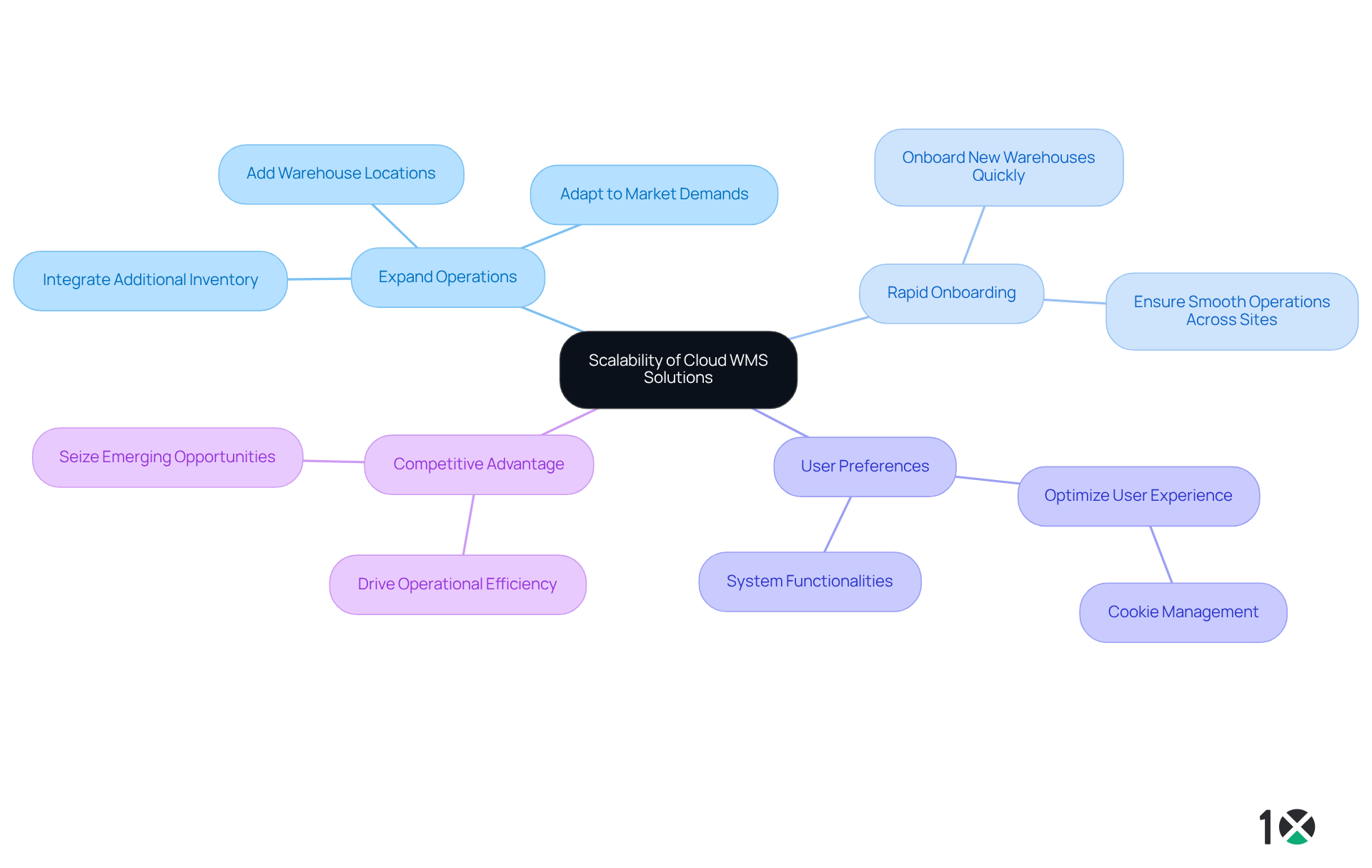
Real-Time Inventory Management: Improve Accuracy and Efficiency
Real-time inventory management, enabled by 10X ERP’s cloud based WMS, empowers distributors to maintain precise stock levels while significantly enhancing order fulfillment rates. With robust accounting features and real-time information processing, businesses can continuously track inventory, swiftly identify discrepancies, reduce excess stock, and prevent stockouts. This capability streamlines operations and elevates customer satisfaction by ensuring product availability when required.
For instance, automated alerts promptly notify managers when stock levels dip below a predefined threshold, facilitating timely reordering. Companies leveraging a cloud based WMS with 10X ERP’s real-time tracking report a remarkable 30% increase in inventory turnover rates and a 20% reduction in excess stock, underscoring the effectiveness of these systems in optimizing inventory management.
Additionally, the customizable tracking and powerful cross-referencing features of 10X ERP can increase operational efficiency by up to 50%, further enhancing overall business performance.
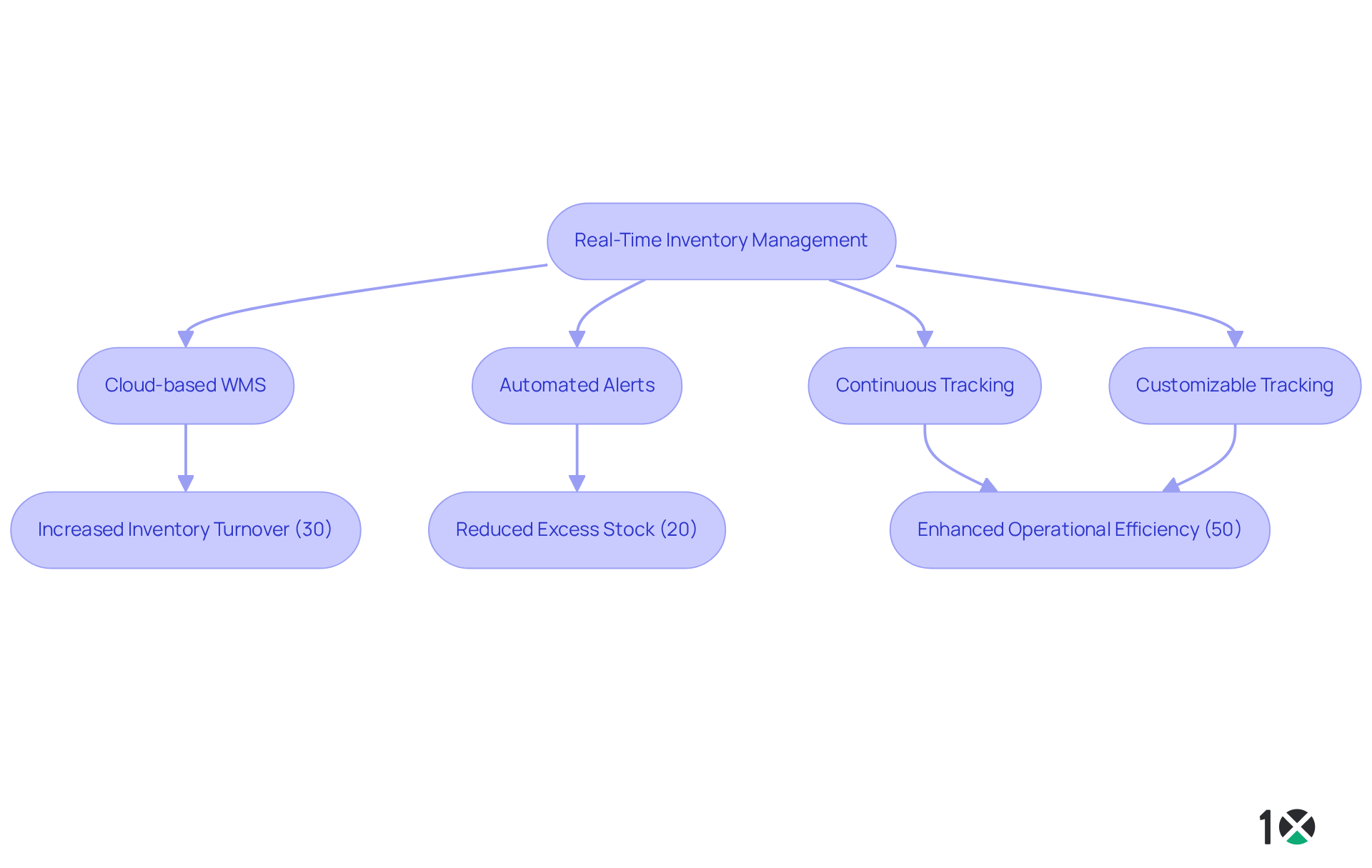
Enhanced Collaboration: Streamline Operations with Cloud WMS
Cloud based WMS are revolutionizing collaboration by providing a centralized platform for real-time information access. This enhanced transparency not only fosters improved communication among internal teams but also fortifies relationships with suppliers and customers, ultimately driving more efficient operations. Consider the example of 10X ERP: warehouse personnel can quickly relay updates on inventory levels to sales teams, ensuring that customer inquiries are addressed without delay. Furthermore, 10X ERP’s cloud based WMS facilitates seamless collaboration with external partners, including logistics providers, thereby optimizing shipping and receiving processes.
As organizations increasingly adopt cloud solutions, an impressive 94% report enhanced security and operational efficiency. This statistic underscores the transformative impact of centralized information access on distribution workflows. Additionally, productivity levels have surged by 10% due to enhancements in team collaboration. This highlights the effectiveness of 10X ERP’s cloud based WMS in boosting operational efficiency, making it a compelling choice for Operations Managers seeking to elevate their logistics and warehouse management strategies.
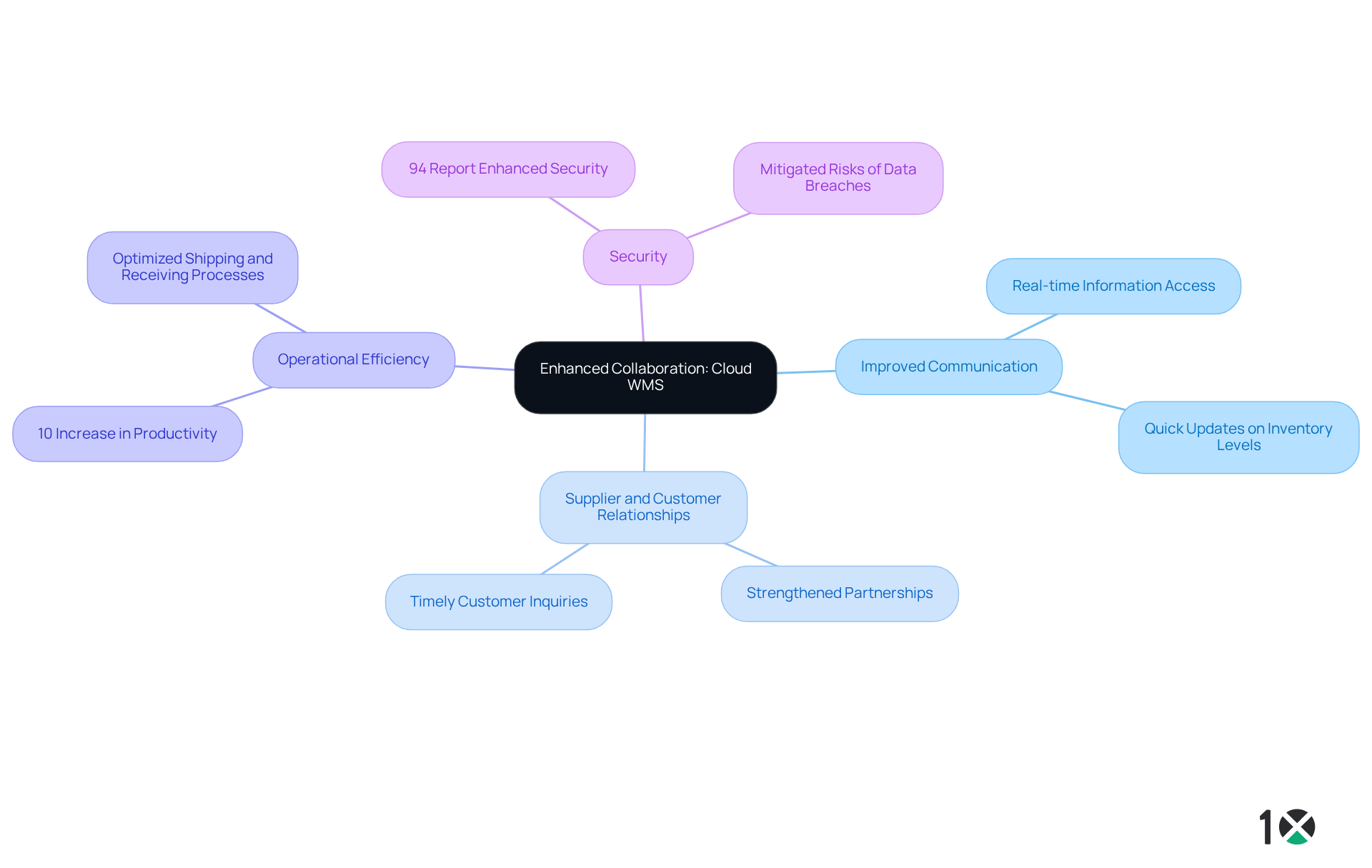
Seamless Integration: Connect with Existing Systems Effortlessly
Cloud based WMS solutions are expertly crafted to integrate seamlessly with existing systems, including ERP and CRM platforms. This integration guarantees that information flows effortlessly between various applications, significantly reducing the risk of errors and duplication.
For instance, when an order is placed, the WMS can automatically update inventory levels in the ERP system, thereby providing a unified view of operations. Such connectivity not only enhances efficiency but also empowers businesses to maximize their existing technology investments with a cloud based WMS.
Furthermore, just as cookies aid websites in remembering user preferences, efficient information flow in WMS solutions is crucial for elevating operational efficiency in distribution, facilitating real-time visibility and informed decision-making.
Advanced Security Protocols: Protect Your Data with Cloud WMS
Cloud based wms are equipped with advanced security protocols designed to safeguard sensitive information from unauthorized access and cyber threats. Key measures such as:
- Encryption
- Multi-factor authentication
- Regular security audits
play a crucial role in protecting customer information and ensuring compliance with industry regulations. For instance, a cloud WMS can automatically encrypt information during transmission, significantly lowering the risk of breaches.
Organizations that implement these security protocols not only enhance their information protection but also strengthen customer trust. As emphasized by cybersecurity specialists, the adoption of strong security protocols is crucial in today’s digital environment, where 82% of breaches involve cloud-stored information (IBM X-Force). Distributors prioritizing advanced security protocols can effectively mitigate risks associated with cloud environments, ensuring that sensitive information remains secure and compliant with regulatory standards. This proactive approach not only protects the organization but also fosters confidence among customers, reinforcing the value of cloud based wms in the distribution sector.
Furthermore, understanding the shared responsibility model is essential, as it delineates the security roles between cloud providers and users, ensuring comprehensive protection.
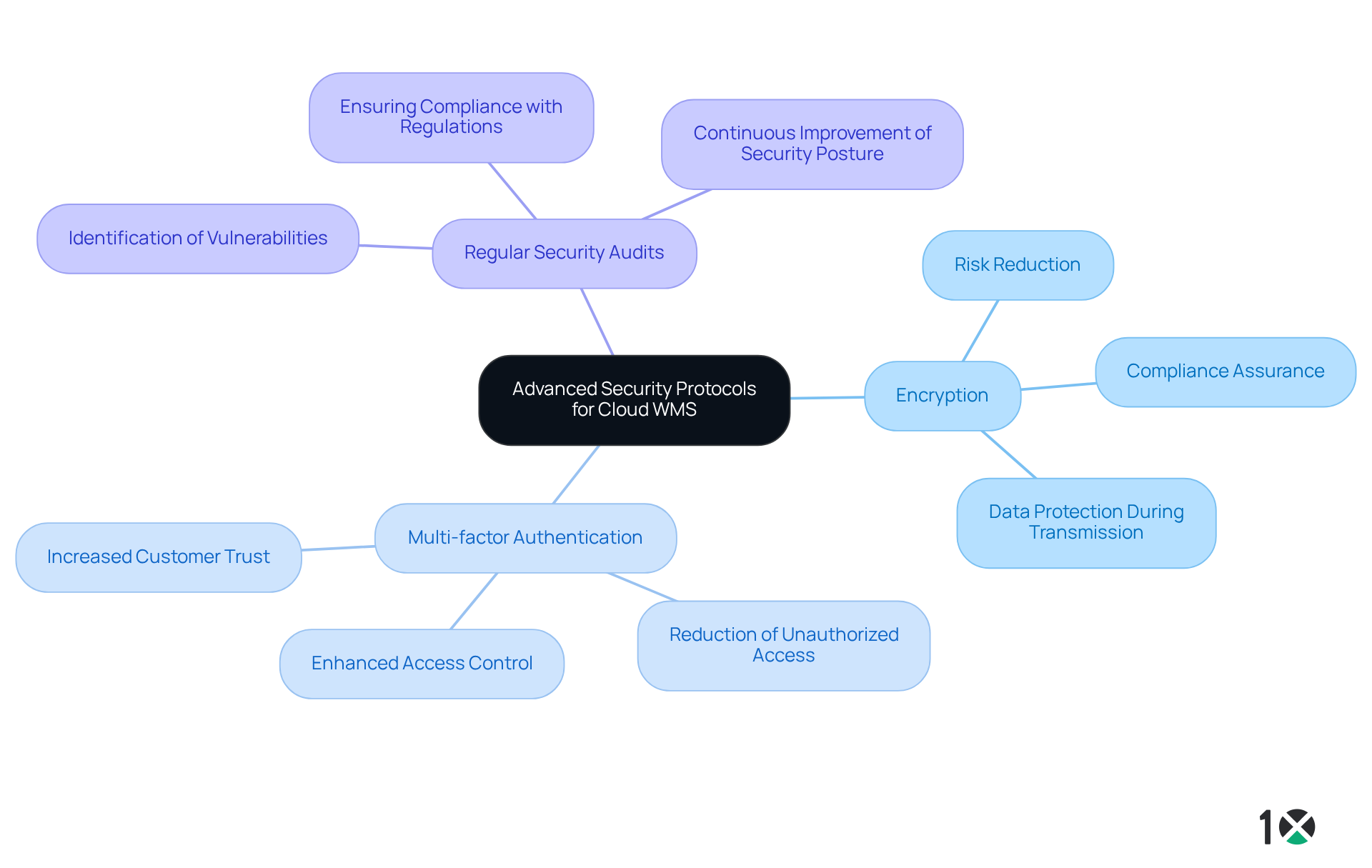
Business Continuity: Ensure Uninterrupted Operations with Cloud WMS
Cloud-based Warehouse Management Systems (WMS) significantly enhance business continuity by offering robust information management and backup capabilities. 10X ERP exemplifies this with its superior cloud-hosted servers and continuous information backup, ensuring high availability and quick restoration of operations in the event of a system failure or disaster. Organizations leveraging cloud solutions like 10X ERP have found that 59% of businesses migrating to the cloud reported improved business continuity capabilities, with many experiencing faster recovery times compared to traditional methods.
Routine information backups are crucial, as 58% of backups fail during recovery due to outdated technology or inadequate testing. This underscores the necessity of reliable backup solutions. Such reliability is vital not only for maintaining operational efficiency but also for preserving customer trust. Industry experts highlight the escalating cost of downtime, averaging $5,600 per minute, which emphasizes the importance of effective disaster recovery plans.
Moreover, statistics reveal that 90% of businesses fail within a year if they cannot resume operations within five days following a disaster. Proactive disaster recovery strategies are essential for minimizing downtime in distribution. With 10X ERP’s comprehensive cloud based WMS solutions, businesses can confidently navigate today’s dynamic environment and ensure they are prepared for any challenges that may arise.
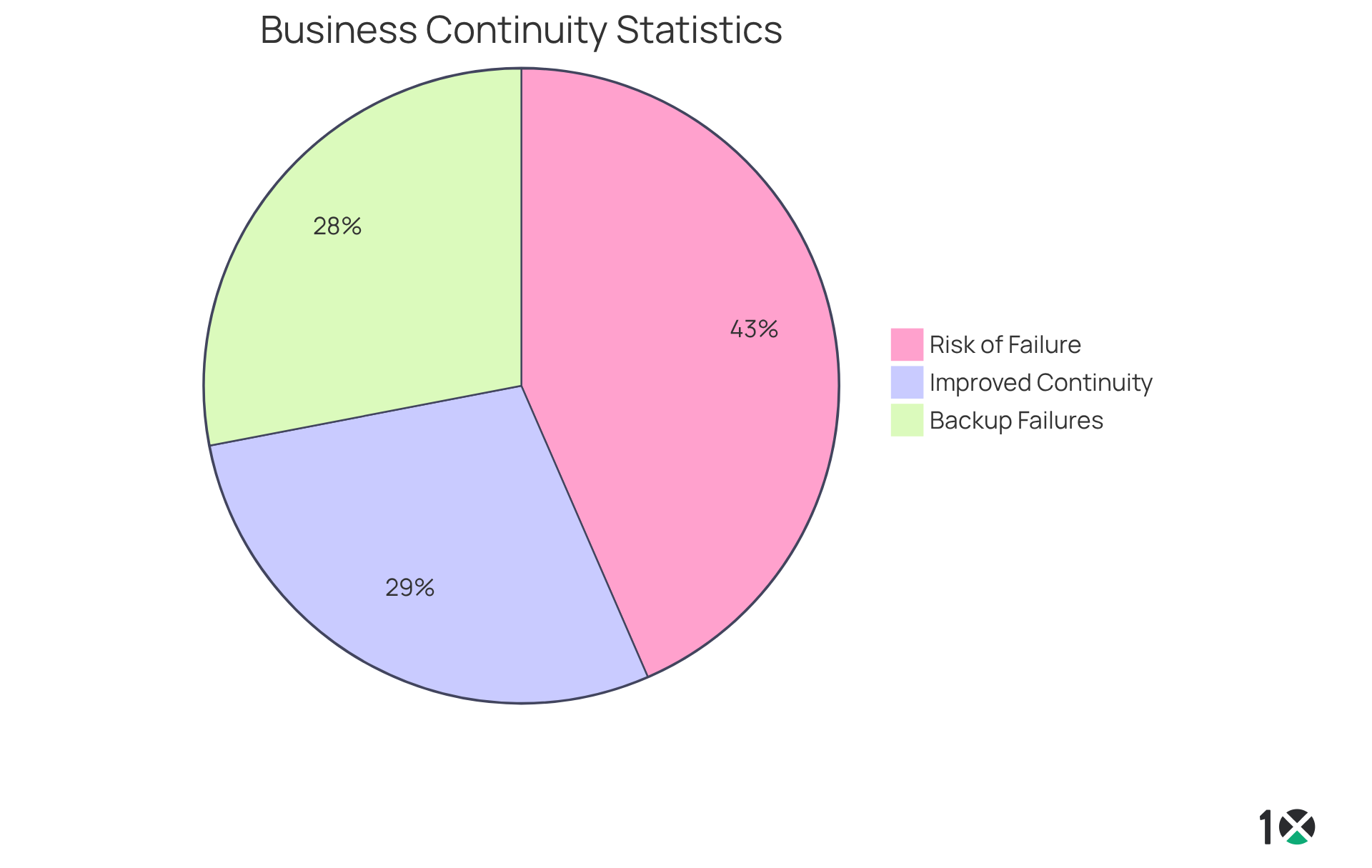
Automated Order Picking: Boost Efficiency in Distribution
Automated order picking systems that are integrated with cloud based WMS are revolutionizing efficiency in distribution operations. Technologies such as pick-to-light and voice picking significantly reduce picking errors and enhance throughput. For instance, the pick-to-light system directs pickers to the exact locations of items, minimizing travel time and ensuring rapid order fulfillment. This streamlined process not only boosts productivity but also elevates customer satisfaction by guaranteeing timely deliveries. Companies that have adopted these technologies report a remarkable reduction in order fulfillment errors—over 60% in some cases—demonstrating the effectiveness of automation in meeting modern consumer demands.
Embracing automation, particularly through cloud based WMS, is essential for maintaining a competitive edge in today’s fast-paced market, where efficiency and accuracy are paramount. With 10X ERP’s strong accounting functionalities and real-time information processing capabilities, distributors can further enhance their order picking processes. The software’s seamless integrations and user-friendly interface ensure that operations run smoothly, allowing for better decision-making and enhanced inventory management. By leveraging these advanced features, businesses can not only meet but exceed customer expectations.
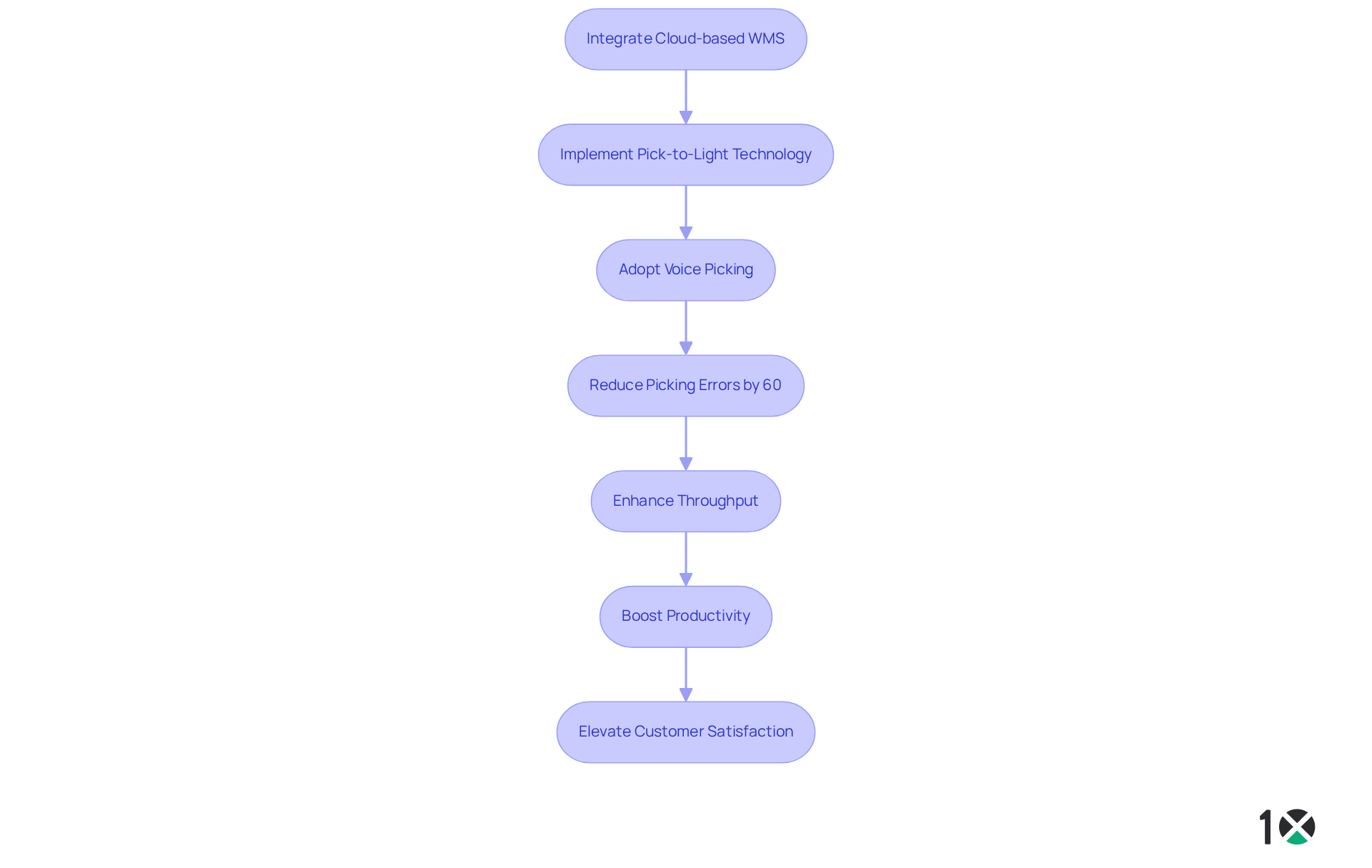
Future Innovations: Embrace the Next Generation of Cloud WMS
The future of cloud based wms is poised for remarkable advancements, propelled by ongoing innovations that significantly enhance operational efficiency and user experience. Emerging technologies—such as artificial intelligence (AI), machine learning, and the Internet of Things (IoT)—are poised to revolutionize warehouse management practices. For example, AI algorithms can analyze historical data to predict demand patterns, enabling distributors to optimize inventory levels and minimize excess stock. Concurrently, IoT devices facilitate real-time tracking of goods throughout the supply chain, providing visibility that enhances decision-making and responsiveness to market fluctuations. By harnessing these advancements, distributors can streamline their operations and swiftly adapt to evolving customer demands and market conditions.
10X ERP exemplifies this evolution with its robust inventory management features, including customizable tracking and powerful cross-referencing capabilities. With an API-first approach, 10X ERP allows seamless integration with virtually any software, ensuring that distributors can adapt to new technologies as they arise. Additionally, 10X ERP offers a seamless user experience and a transparent pricing structure, making it easier for businesses to grasp the value they receive as they grow. With 10X ERP’s comprehensive cloud based wms solution, distributors are well-equipped to embrace future innovations.
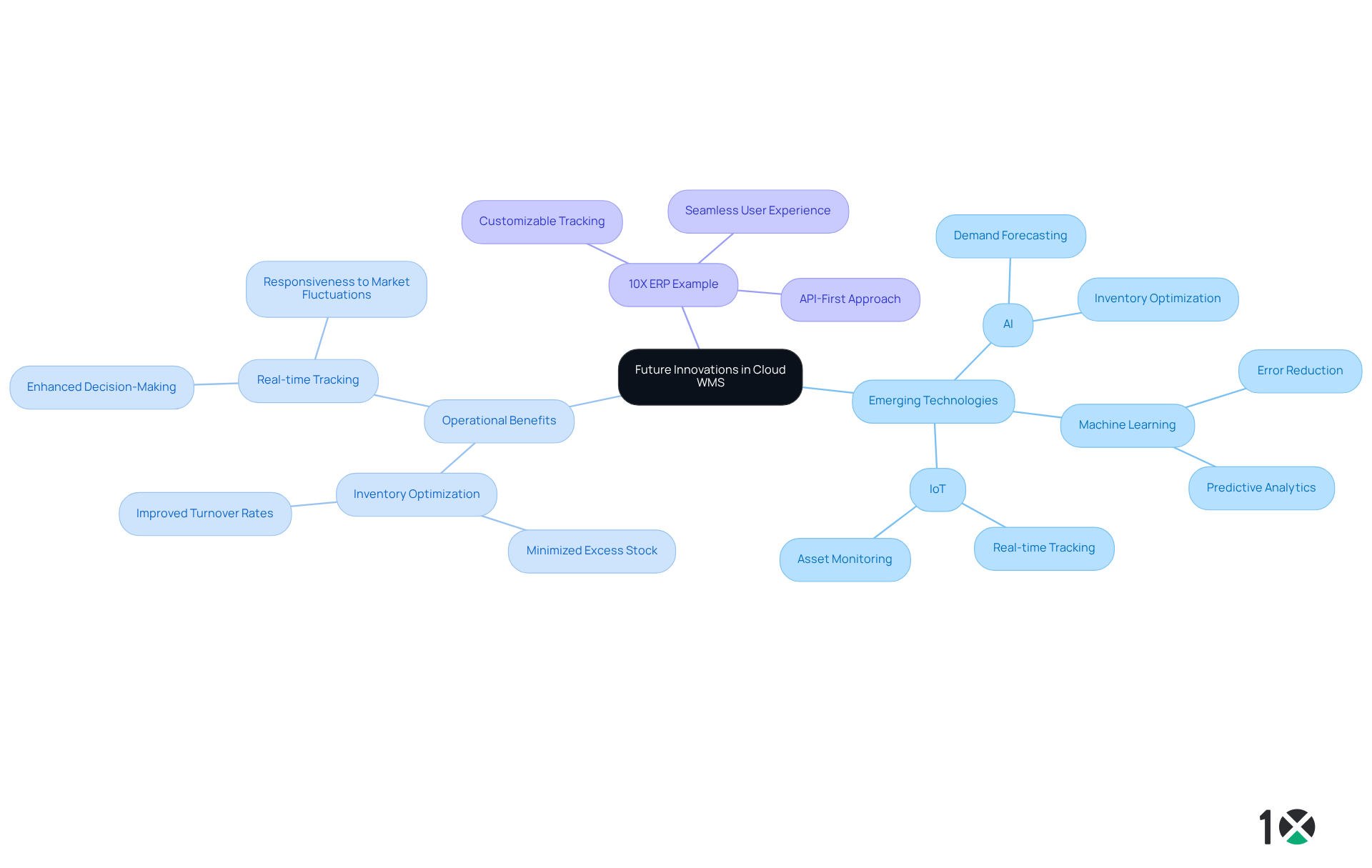
Conclusion
Cloud-based Warehouse Management Systems (WMS) deliver transformative benefits that significantly enhance the efficiency of distributors. By leveraging real-time data processing, these systems empower organizations to monitor inventory, streamline operations, and make informed decisions swiftly, ensuring they remain competitive in a dynamic market. Transitioning to cloud solutions not only reduces operational costs but also enhances scalability, enabling businesses to adapt seamlessly to growth and changing demands.
Throughout this article, the advantages of cloud-based WMS have been underscored, including:
- Cost-effectiveness through subscription models
- Improved order accuracy
- Enhanced collaboration among teams and suppliers
The ability to integrate seamlessly with existing systems ensures that information flows effortlessly, reducing errors and enhancing operational efficiency. Furthermore, advanced security protocols protect sensitive data, fostering customer trust and ensuring compliance. The emphasis on business continuity and automated order picking illustrates how these systems can mitigate risks and boost productivity, respectively.
As the landscape of warehouse management evolves, embracing cloud-based solutions becomes increasingly essential for distributors aiming to thrive. The integration of emerging technologies such as AI and IoT will further revolutionize operations, positioning businesses to respond effectively to market fluctuations and customer needs. By adopting cloud-based WMS, distributors are not merely investing in a system; they are laying the groundwork for sustained growth and innovation in a rapidly changing environment.
Frequently Asked Questions
What is 10X ERP and what benefits does it provide?
10X ERP is a cloud-based system that offers real-time data processing, allowing distributors to monitor inventory levels, track shipments, and manage orders quickly and accurately. This enhances decision-making, minimizes delays, and improves customer satisfaction by preventing stockouts and overstock situations.
How does real-time inventory tracking impact businesses?
Effective real-time inventory tracking optimizes supply chain coordination, with 70% of businesses reporting improved customer experiences after ERP integration. It empowers distributors to make informed decisions, streamline operations, and increase profitability.
What are the cost advantages of cloud-based Warehouse Management Systems (WMS)?
Cloud-based WMS significantly reduce operational costs by eliminating the need for expensive on-premises hardware and maintenance. They offer a subscription-based model, which avoids substantial upfront investments and provides scalable services tailored to demand.
How do cloud-based WMS improve operational efficiency?
Cloud-based WMS streamline processes, leading to lower labor costs and fewer errors. Automated inventory tracking reduces the time spent on manual counts, allowing staff to focus on strategic initiatives, resulting in an average operational cost reduction of 20%.
What improvements can organizations expect from using centralized information systems?
Organizations utilizing centralized information systems can experience a 25% improvement in decision-making speed, enabling better responsiveness to market fluctuations.
What are the scalability benefits of cloud-based WMS?
Cloud-based WMS offer exceptional scalability, allowing distributors to expand operations easily by adding new warehouse locations and adapting to market demands without incurring significant infrastructure costs.
How quickly can a distributor onboard a new warehouse using cloud-based WMS?
A distributor can onboard a new warehouse within weeks, integrating it into their existing system to ensure smooth operations across multiple sites.
What implementation factors should be considered for successful transition to cloud-based WMS?
Key implementation factors include the minimum user requirement of five users and the volume of information to transfer, which are crucial for a successful transition to cloud-based WMS.
